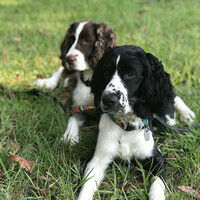For those of you just starting off or those of you composers who have the 'pleasure' of working with a filmmaker who has little or no experience working with a composer, you probably understand the 'difficulty' you may have communicating with the composer and getting an understanding of what they want. Some filmmakers, like in my last film, just give me the whole film completed (except perhaps the colorization and final mix with ADR/Foley) and just say to score it and give them the soundtrack for the final audio mix. That worked real well for me in the last film, the filmmaker seemed to like the final result and the film won in competition (http://youtu.be/uhrlh_g2am0 and http://youtu.be/dWow6DIG6Jc). That is probably more the exception than the rule and it is less likely in a feature (except perhaps a feature documentary). Most of the time you will get vague instructions and you may even get specific artistic instructions like use mostly piano or violin or perhaps even more specific musical direction. Sometimes the filmmaker really understands the creation of music though more often than not, you need to take those directions with a grain of salt :) I am currently working with a filmmaker on our third film together - one short and two very long shorts (30 to 45 minutes). Most the filmmakers so far that I have worked with are very cautious about using a real human composer and so they start off typically by merely asking for music for the opening, opening scene, final scene and end titles. Getting a filmmaker to be willing to put cues into the middle of a film requires 'education' on the part of the composer - not just whether part of a scene or a full scene needs music, but what type of music it needs. These filmmakers need to be reassured that the composer provides a 'service' as the others in post to support the action in the scene and not to dominate it with a symphony. In addition, these filmmakers have no clue about the 'formalities' of interaction and shy away from organization and 'documentation' using things like spotting sessions and cue sheets. They don't understand hit points, for example and often have no way to communicate how the music needs to change in the cue to support the action. Frankly. they often don't understand that music (or sound effects) often need to support those parts of the scene where there is no dialog. So with all this being said, after getting a draft full cut of the latest 45 minute short, I called the filmmaker and we talked on the phone about what type and how much music to use in his film. As I have worked with him before, I have a general idea of the types of music and instrumentation he likes. A month or so ago he gave me an MP3 of a new age track and explained where in the track he liked the music. I created a 'similar' work called Mosaic to 'borrow' things from and gave it to him (http://www.icompositions.com/music/song.php?sid=207453). He didn't think the music or parts of it would fit the film and so it won't be used. I don't mind writing music that gets rejected for a project since composers have to stay busy and always write music in between projects. So I was really pleasantly surprised Mon night when he resent me clips of the opening credits and final scene/end credits with music he borrowed from another well known film, "The Shawshank Redemption" (which is by the way, the #1 rated user film on IMDB with a 9.2 rating - excluding The Interview's 9.9 which isn't a 'real' review). He didn't realize it but he has learnt about the concepts of 'temp tracks'. I explained it to him and that it was a great way to communicate to me the type of music he wants in a scene. I did assure him before we went on vacation that I will be able to create something there that 'sounded' like what he used though he needed to be aware that Thomas Newman was a very experienced "A" list scorer/orchestrator and that he used a full live symphonic orchestra with a rather large music budget. Nonetheless, I'll give him something in the ballpark. Temp tracks are a great way (not the only way) to facilitate communication - use it when you can.


